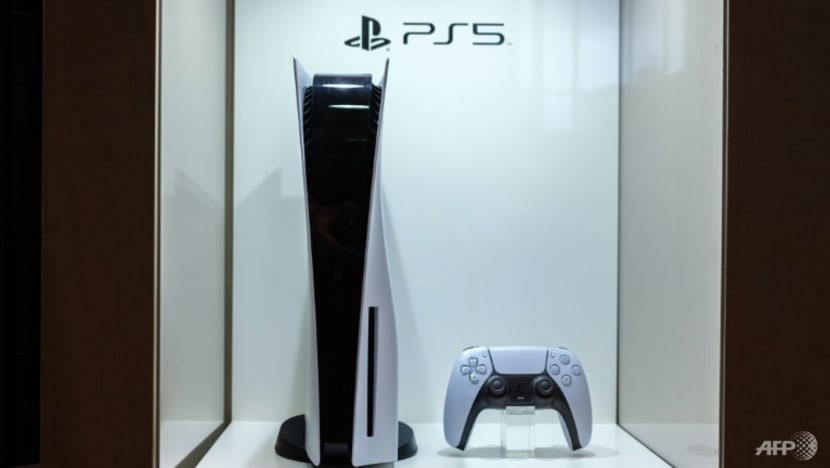Commentary: It's still near impossible to get a Sony Playstation 5
Global economic forces, including semiconductor shortages and supply chain disruptions, are playing havoc with stock of the Japanese videogaming console. But Sony might have other considerations too, says the Financial Times' Leo Lewis.

Sony has faced challenges rolling out its PlayStation 5 console, which remains difficult to get hold of 18 months after its November 2021 launch (Photo: AFP/Philip FONG)
TOKYO: At the end of June, household negotiations over buying a PlayStation 5 (PS5) will enter their 600th day of deadlock. Arrival at this milestone may well bring all parties back to the table, but a breakthrough still feels a long way off.
Part of the delay is that global economic forces are playing havoc with stock, of course. But this is by no means our first version of this argument.
As each enchanting generation of console (particularly those of Sony and Nintendo) has come along, the question of the new machine’s cost-to-justifiability ratio blazes around several talking points.
Is it really that much better than the one you’ve already got? (Absolutely, yes, the existing model is now decade-old tech and just look at game X.) OK, but is it worth US$500 when the games also cost US$60? (Well, yes. See previous answer.) Really? And yet you whinge about the cost of the kids’ trainers. (Yes, but that’s totally different.) And so on.
The support, this time, of a naggy 12-year-old in my lobbying effort has been useful, though not decisive.
STILL NEAR IMPOSSIBLE TO BUY A PS5
But the core difference between this and previous iterations of the argument has been the PS5 itself. In Japan, Sony’s home turf, its games machine has been very difficult to buy from a mainstream retailer.
Normally, there is an initial post-launch stampede and ensuing shortages that all form part of the hype (and fun). Within a year, though, the casual buyer can generally find one without too bruising a quest. Not so with this iteration of the PlayStation.
Launched in November 2020, despite the well-known headwinds of a global semiconductor shortage, it has been buffeted by supply chain difficulties. Sony, which has a real battle on its hands against Microsoft’s Xbox, has been funnelling its machines to particular markets, principally the United States, where it believes victory will be decided.
Japan supplies have thus been unusually thin and, since the start of the year, there have only been three weeks where Sony sold more than 30,000 units here. In one extraordinary week in May, Sony sold only 2,693 PS5s in Japan — an indication, say analysts, that the supply crisis could actually be getting worse.
Those Japanese gamers determined to secure a machine are left relying on store lotteries, luck or a secondary market where “as new” used PS5s trade at 70 per cent above the official retail price.
SONY MAKING A LOSS ON EVERY MACHINE SOLD IN JAPAN
This absurdity has killed the debate in our house. Since its launch, the PS5 has sailed through two Christmases and multiple Lewis family birthdays both hotly desired and defiantly unpurchased.It may be that Sony has an interest in keeping its Japan sales low. Calculated globally, it makes little money on the hardware sales of PS5 units — no problem, given that the real money is made on the software. In Japan, says one analyst who has covered the company for decades, it is probably making a loss of about ¥2,000 (US$15) on every machine sold.
Pelham Smithers, another veteran Sony watcher, suspects the spew of red ink could be even more severe, with material costs rising significantly amid global inflation and high energy prices, and with the yen plunged to a 20-year low.
That combination, says Smithers, could mean that Sony is losing about ¥15,000 on every PS5 it sells in Japan. That could be an incentive for it to ensure that stores and online retailers are not flooded with machines.
Sony’s gaming chief did recently announce “a significant ramp-up” in PS5 production this year, but for now, I’ll have to make do with our PS4 — itself the result of a successful round of household negotiation.















